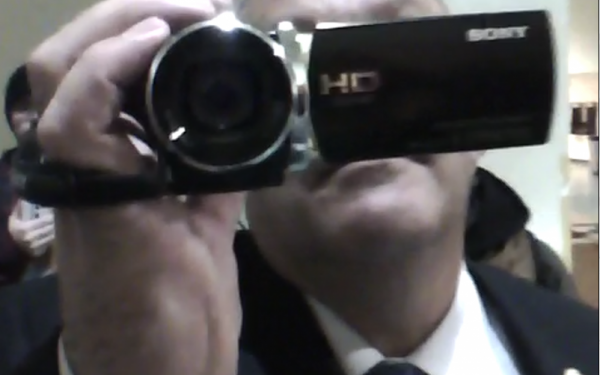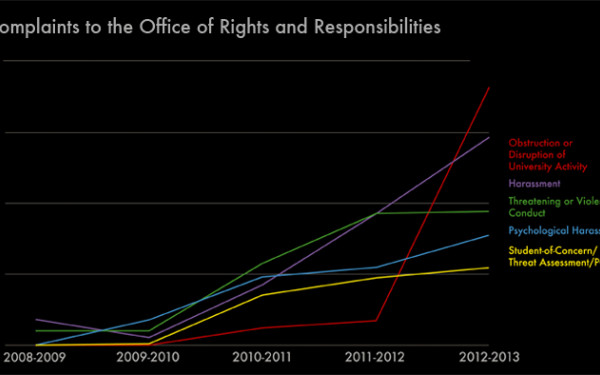Protesters Served Formal Complaints from Professor Following Hard Picketing
“No Tribunal for Students” Campaign Denounces Charges
A campaign called “No Tribunals for Students” was created yesterday after several students who picketed a political science class at the beginning of the month were handed formal complaints from faculty.
A photo popping up on the social media accounts of students and student executives shows an open body of water set against a foggy sky with the campaign’s slogan.
“Tribunals” refer to the hearings those who were served a complaint will face. According to the press release, academic consequences vary and could lead to expulsion.
“We see this [as] no more than political targeting within our campus, and are deeply offended that administration would legitimize these complaints,” reads a press release and campaign website shared by Concordia student Katie Nelson.
The complaints were given to a handful of students who identified themselves to political science professor Graham Dodds, the teacher of the interrupted class on April 1, according to Nelson. The grievances were filed under article 29G for the “obstruction or disruption of University activities” in Concordia’s Code of Rights and Responsibilities.
The campaign calls for Concordia’s administration to take a stand against the formal complaints due to their “political nature,” despite the administration’s precedent of staying out of complaints filed to the Office of Rights and Responsibility. Complaints filed to the office follow independent procedures, outside of administration influence, according to the university’s spokesperson.
“We further encourage all faculty to take positions with students as we fight for sustainable education, and immediately reconsider their participation in repressing the voices of students at Concordia University,” reads the press release.
In a video published by The Link the day of the picketing, Dodds appears upset and stands still at the front of the classroom while protesters chant and bang pots around him.
Nelson said he refused protesters’ proposition to hold a discussion instead of the hard picketing that took place. The teacher told strike coordinators he would record every protester’s name and asked if they would pose for pictures.
“It was pretty clear he was against the notion of protesting austerity measures,” Nelson said.
Five student associations, including communications, liberal arts, political science, geography, planning and environment, and sociology and anthropology graduate students all voted to strike April 1 and 2, during their respective general assemblies in March.
Nelson said a discussion about the Liberal government’s austerity measures did finally take place during that class, though Dodds did not participate.
“It discourages students from participating in the [ strike ] process to begin with.” — Katie Nelson
“It was a really productive conversation,” she said.
Dodds did not respond to The Link’s request for comment, which was sent outside of business hours Friday night.
Filing complaints against students during times of protest, when activists interrupt classrooms in faculties that voted to strike, is nothing new at Concordia.
In the 2012-2013 academic year, the school reported 82 formal complaints , a record, following strikes against former premier Jean Charest’s proposed tuition hikes.
But Nelson says this incident was especially political.
“I think the spirit of why what happened happened and why we received the complaint is especially important,” Nelson said over the phone, because students had voted to strike on that date. Consequences, like those a formal complaint may bring, could discourage students from voting for a strike during a general assembly, she said.
“It discourages students from participating in the process to begin with,” she said, noting that could harm the democratic process of those votes.
According to Chris Mota, no complaints have been filed by Concordia’s administration. She also said the complaints filed by the university in 2012 were dismissed when President Alan Shepard began working at Concordia.
The complaints process, she says, normally goes through an informal process of mediation, but will be presented in front of a tribunal if the parties don’t agree. The tribunal in this case will be made up of two students and one faculty member.
Consequences could range from a written reprimand to expulsion.
“That’s decided by the tribunal, not the university,” Mota said.
Nelson said she isn’t sure how many students will face tribunals because the names of others who received complaints were blocked out. She was notified of hers at around 3 p.m. Friday.
She and other students facing grievances are trying to reach out to students that are in the same boat.
-with files from Kalina Laframboise and Michelle Pucci

_900_419.png)
_600_832_s.png)



